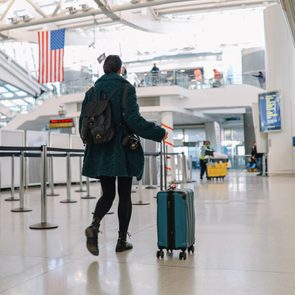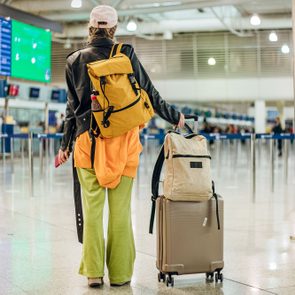It's smarter to play it safe and wait in your terminal than gamble with unpredictable departure times. Our expert explains why.

Here’s Why You Should Always Get to the Airport on Time—Even if Your Flight Is Delayed

You’re wrapping up a beach vacation, soaking up the sun but dreading returning to reality. Just as happy thoughts are clouded by thoughts of the impending trip to the airport, your phone buzzes with an alert from the airline: Your flight has been delayed. So do you kick back and continue to relax, or should you play it safe and head to the airport anyway?
At the end of a magical Disney World vacation, Reader’s Digest Deputy Editor Anne Fritz and her daughter encountered a similar dilemma. Their JetBlue flight home to New York was scheduled for 6:55 p.m., but around 1 p.m., Fritz started receiving delay alerts—first pushing their departure to 8 p.m., then to 9:18 p.m. Still at the resort, she debated whether it was wise to linger a bit longer. “We had already prearranged our shuttle to the airport, so we went on ahead,” Fritz says.
She made the right call. While relaxing in the Priority Pass lounge at Florida’s Orlando International Airport, a staff member gave her a heads-up that JetBlue often moves up departure times after initially listing a delay. Sure enough, at around 6:10 p.m., Fritz’s phone buzzed again. This time, her flight had been rescheduled to 7:36 p.m., an hour and 42 minutes earlier than expected. “I’m sure there were passengers who missed the plane because of the delay alert,” she says. “The flight wasn’t very full.”
But was this just a fluke, or should you take her experience as a lesson? We turned to Eric Napoli, chief legal officer at AirHelp, a travel tech company specializing in flight disruptions and air passenger rights, to get his expert take on the topic. Read on to learn what you should do next time you’re notified of a delayed flight.
Get Reader’s Digest’s Read Up newsletter for more travel, tech, cleaning, humor and fun facts all week long.
Why should you still get to the airport on schedule—even if your flight is delayed?
When a flight is delayed, it may be tempting to take your sweet time getting to the airport, but that could leave you scrambling. There are still plenty of variables that might trip up your trip, from unexpected traffic to long security lines. And then there’s the volatility of those reported delays. “Flight delays can be uncertain, and depending on the reason for it—weather, staffing, mechanical—flights can, on occasion, depart earlier than the original delay estimate,” Napoli says. “It’s better to be at the airport and wait it out.”
He explains that hanging out in the terminal also gives you an advantage. If your flight experiences further disruptions, it’s much easier to receive real-time updates directly from the airline, as well as accommodations or other concessions if the delay becomes significant.
Why would an airline move up a departure time after announcing a delay?
Airlines prioritize efficiency, and that extends to interacting with travelers. “Airlines will, on occasion, overestimate a delay to help manage passenger expectations,” Napoli says. While this can occasionally cause logistical issues, he points out that the practice is preferable to the alternative—dreaded creeping delay alerts pinging phones that just frustrate passengers and keep them on edge.
At times, an earlier departure after a delay is simply the airline doing a good job resolving an issue faster than expected. “Some causes for delay, such as maintenance, staffing or weather, can resolve faster than anticipated, resulting in an earlier departure time than the original estimate,” Napoli says.
Keep in mind that larger hubs are often better equipped to handle situations than smaller airports since they have greater flexibility and access to a larger fleet of aircraft and crew members. “In the event of a mechanical issue, it’s easier to replace the aircraft, or if one crew member has timed out, it’s easier for larger airports to have another crew member on standby,” Napoli notes. “This makes it more likely to resolve a delay faster, course correct and keep the flight departure as close as possible to the original time.”
What recourse do you have if you’ve missed your flight because of a previously announced delay?
It’s always a gamble to hold off on heading to the airport, including when a flight is disrupted for a lengthier amount of time. Unfortunately, if you miss your plane after the airline has indicated there was a delay—even when the disruption was shortened—the airline isn’t at fault. “If you are responsible for missing a flight, you will not be entitled to compensation, and you would be responsible for the costs incurred,” Napoli warns.
There are steps you can take to salvage your trip. Most importantly, immediately contact the airline and let them know you’ve missed the flight. Otherwise, you could be declared a no-show, which may lead to the airline canceling your entire itinerary, including any connections or return flights you have scheduled. “This way, you can work with the airline and start thinking about a solution,” Napoli advises.
In many cases, airlines will assist in rebooking you on the next available flight, though there may be a fee or a fare difference to pay if the new ticket costs more than the original.
Napoli adds that if the next possible flight is full, your best bet is to request to fly standby. If you’re already at the airport and want to be on your way, you can also check other airlines for alternative flights, though that option may come at an additional cost.
About the experts
|
Why trust us
Reader’s Digest has published hundreds of travel stories that help readers explore the world safely, easily and affordably. We regularly cover topics such as the best places to visit (and the best times to visit them), tips and tricks to zoom through airport security, flight-attendant secrets, hotel-room hacks and more. We’re committed to producing high-quality content by writers with expertise and experience in their field in consultation with relevant, qualified experts. We rely on reputable primary sources, including government and professional organizations and academic institutions as well as our writers’ personal experiences where appropriate. We verify all facts and data, back them with credible sourcing and revisit them over time to ensure they remain accurate and up to date. For this piece, Aaron Rasmussen tapped his experience as a longtime travel writer and travel guidebook editor to ensure that all information is accurate and offers the best possible advice to readers. Read more about our team, our contributors and our editorial policies.
Sources:
- Eric Napoli, chief legal officer at AirHelp; interviewed, March 2025



